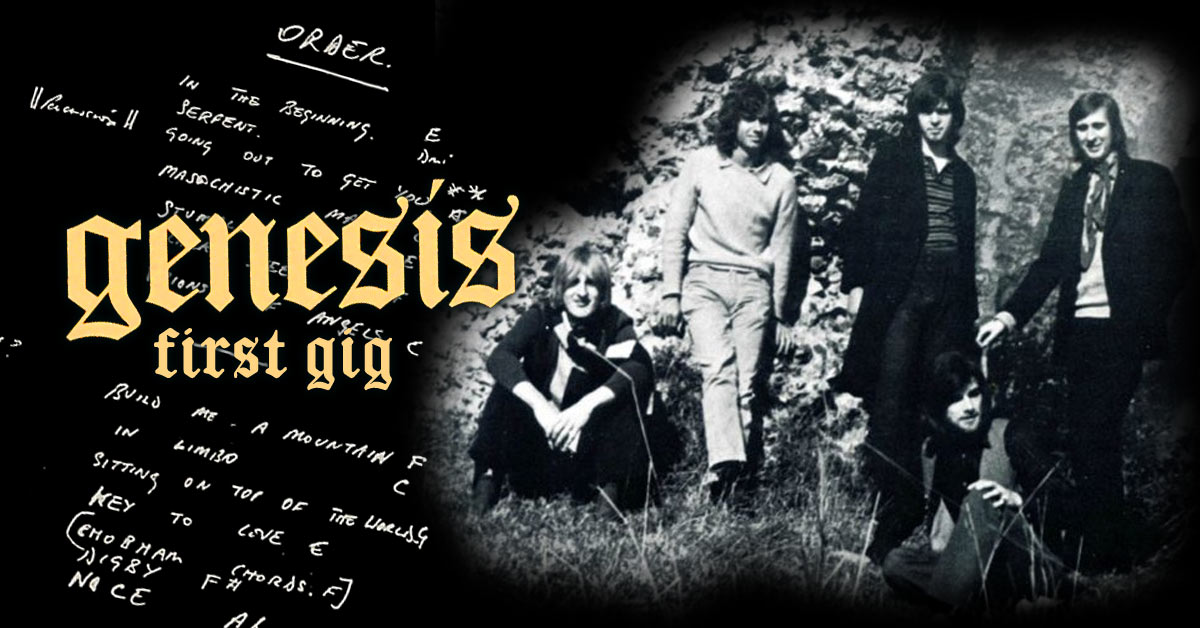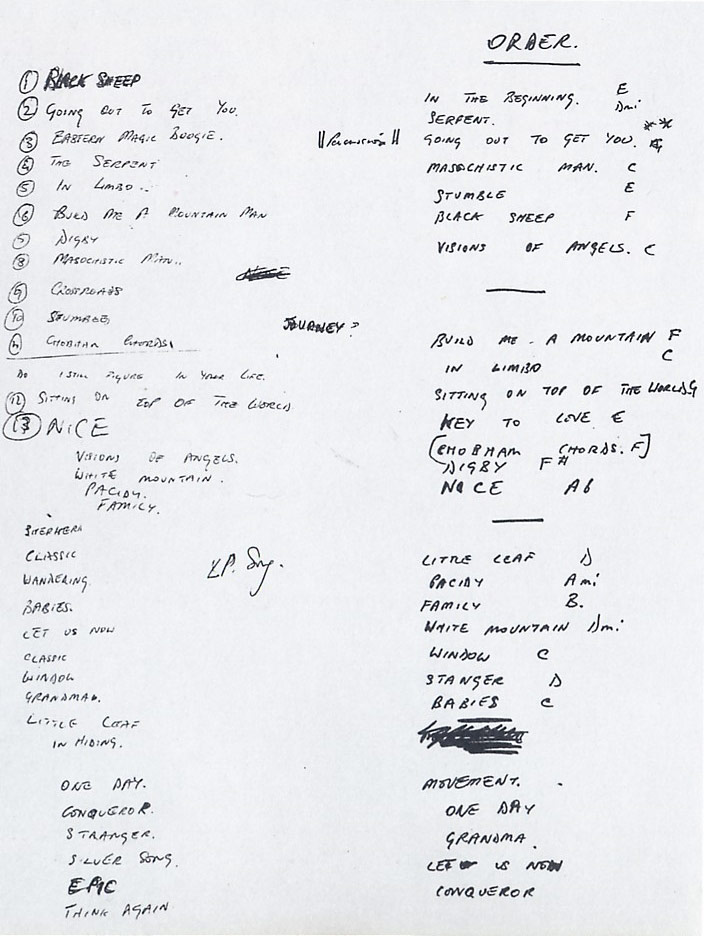- Article
- Read in 13 minutes
Genesis – 50 Years Ago: The first Genesis concert (26th October 1969)
50 Years ago … Genesis played their first ever gig on 26th October 1969. Steffen Gerlach reflects this important day in the history of Genesis.
The first rehearsals, the first song, the first recording, the first single, the first change in line-up, the first break period … There had been a string of firsts in the two-and-a-half years of the band's history since Easter 1967. One important first was still missing, though: A live performance!
It was something they had not planned, for the band saw themselves as a songwriters' cooperative who were lucky enough to record their own songs. A career as a band was not their goal, and when the commercial failure of From Genesis To Revelation became evident during the months of their inactivity it did, understandably, nothing to change that. Still, their time together had left its marks, and when Anthony Phillips, Mike Rutherford, Peter Gabriel, Tony Banks and John Silver came together again in the summer of 1969 to make music and be creative they all felt that that was what they enjoyed best.
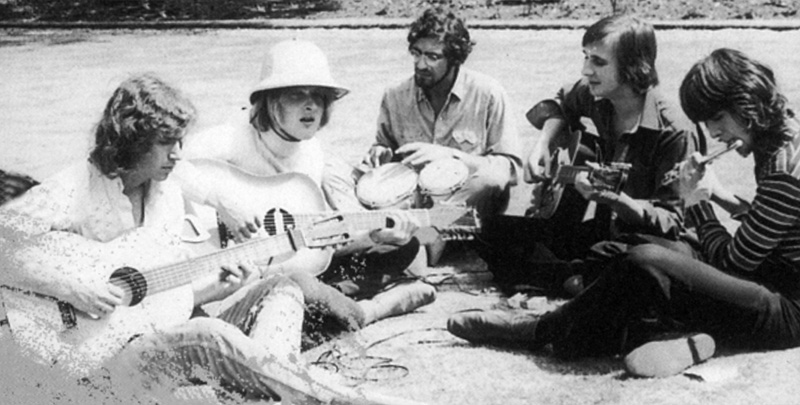
Their old friend Richard Macphail shared their enthusiasm. After several months in Israel he was excited at how much potential their band sound had developed. He encouraged them to go on and supported them as their handyman. In the end they decided to focus on Genesis. John Silver was the only one who got cold feet. The drummer decided against a career as a musician and for university in the United States, but he kept working on new material with the band until he left the country. The one-year contract with Jonathan King's JonJo label expired at the end of August 1969, so the band had to go on without external support.
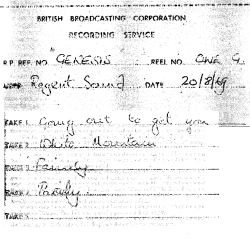
On August 20 they paid for studio time at London's Regent Sound studios to record a demo with four new songs to present to labels and promoters. They knew that they would not be able to go on without live performances and new fans. They wanted to start playing live in autumn, and the band were looking for business as well as a new drummer. From September 22 to October 3, they rehearsed at Send Barns, the house of Anthony Phillips's parents near Woking, before they transferred to a place near Wotton where Macphail's parents had a cottage they wanted to sell the next spring. Thanks to Macphail's insistence they were allowed to live there for the time being. There were six of them, the four musicians, Macphail and the new drummer John Mayhew. He used to give everybody in the London music scene his number because he was looking for a new gig. In the end it fell into Genesis' hands, and the got the job not least because of his experience as a live drummer.
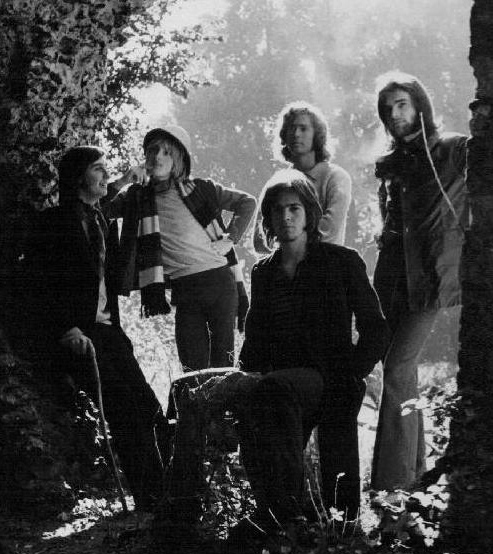
The band got a gig as the support act at Brunel University, London, on Saturday, November 1, 1969, which was a kind of showcase for labels and promoters. The band's played their very first live performance a week before that, though, on Sunday, October 26, at a private event (and NOT on the 23rd October, a date whoch is beong seen often in publicatiuons). There was a birthday party in Chobham, Peter Gabriel's home town in Surrey, and a live band was wanted for that. The mother and sisters of birthday boy Anthony Balme (who turned 21 on October 27) set up the event, and Mrs Balme asked her friend Irene Gabriel, Peter's mother, whether her son's band could play there for 25 pounds. The lads agreed! (Read a very detailed research into that event on this Italian blog) The party took place at the Balmes's, a villa called Garth House in Chobham. The band were to play at the inner court. Unfortunately, Sunday turned out cold so that most party guests preferred to stay inside. Of course, the band's repertoire was not necessarily easy to dance to, but that did not stop Genesis from going through with their "public rehearsal", as it were. Little is known about the equipment the band used (Tony Banks had bought a Hammond C3 organ which he played through a homebuilt Leslie amplifier while Ant used a Vox AC30 amp) for there are neither photos nor any kind of audio/video recordings from that night. One thing that did survive from that night was a document that merits closer inspection: the set list of the night in Peter's handwriting!
This is most instructive, for it reveals where the band were standing at this crucial moment in their history, shortly after a euphoria-filled creative summer and the decision to go pro after the Jonathan King disaster and shortly before the intense period at the Macphail's cottage in the winter of 1969/70 that would shape the band to a band with their own sound and make them into a live act to be reckoned with. Which of the more than 50 songs made it into the first live set? What old songs did the band discard, which new songs did they consider good enough to play live? Peter Gabriel's handwritten notes give us a glimpse into the musical world of Genesis as of October 1969. There is a shortlist of songs on the left side of the sheet, while on the right we find what was probably the set list of the night.
We have created a Youtube Playlist so you can listen in, as it were.
The first set
The band kick of their first live gig aptly with In The Beginning, a rock song by Phillips with lyrics by Gabriel. It was first recorded as a demo in the summer of 1968 and again, in September, for their debut album From Genesis To Revelation.
They keep up the momentum with The Serpent, another uptempo song from From Genesis To Revelation. This Banks/Gabriel composition was first recorded with different lyrics on Easter 1967 on the band's very first demo tape as She Is Beautiful. This very first collaboration between Banks and Gabriel prompted Jonathan King to offer the band a contract. In summer 1967, another demo was recorded for King.
The lively piano-based Going Out To Get You, probably also written by Banks and Gabriel, came about in summer 1969. It was one of four tracks the band recorded on August 20, 1969, for their new demo tape after their contract with King ran out. The song would develop and remain in Genesis live sets well into 1972. Early in 1971 a studio version of it is produced as the potential first single of the new line-up of Banks, Collins, Gabriel, Hackett, and Rutherford – this recorded is probably lost.
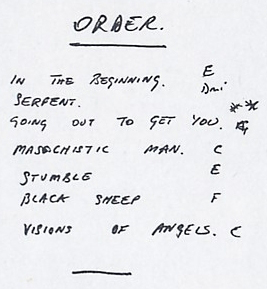
Little is known about the next song, Masochistic Man. Written in C (according to the set list), we only know one line of the lyrics Gabriel wrote for the song. The song has apparently never been recorded, but it was played live regularly in 1969.
After four of their own songs the band played the first of two cover songs in their first set. The Stumble is an instrumental blues classic. The original was written by blues legend Freddy King with Sonny Thompson, but it was probably the popular 1967 interpretation by John Mayall & The Blues Breakers that Genesis used as a blueprint. Incidentally, Steve Hackett would go on to cover this song on his 1994 album Blues With A Feeling, too.
Black Sheepwas the second cover in the set. The original appeared on the debut album of SRC (Scot Richard Case), a psychedelic rock band from Detroit. The band are considered an early influence on Genesis. The prominent use of Hammond organ, similar to bands like Procul Harum, stressed that.
The first set ended with Visions Of Angels, Anthony Phillips' most important composition to that point. Phillips wrote that song on the piano in the vein of contemporary Beatles or Beach Boys songs in early 1968. It was recorded during the album sessions for From Genesis To Revelation in early September 1968, but since the band did not like any of the takes the song was not used on the album. The song was a staple of the live set until Phillips left the band; it was also recorded for the band's next album, Trespass (1970).
The second set
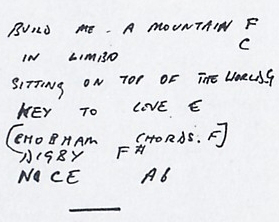
The second set began with Build Me A Mountain, another song from the From Genesis To Revelation album sessions in September 1968 that did not make it on the album. It stayed in the live set list for a while. An acetate of the song has a piano intro from Tchaikovsky's Swan Laketheme. Whether that was also part of the live performance is not known.
In Limbo is another song from From Genesis To Revelation. It was written by all the band together. The brass arrangement on the song is unlikely to have been performed live by the band.
The second set had another two cover songs. Sitting On The Top Of The Worldwas first released by the Mississippi Sheiks in 1930 (and written by their band members Walter Vinson and Lonnie Chatmon). The Genesis performance of this frequently covered song would have been based on the version Cream released in 1968 on the album Wheels Of Fire – Eric Clapton wanted to play this song with the band.
Key To Love was the second cover that related to Clapton. It was written by John Mayall and appeared in 1966 on his blues rock album John Mayall Blues Breakers with Eric Clapton, also known as The Beano Album.
Not much is known about the song Chobham Chords other than it is played in F. Since Chobham is Peter Gabriel's home town it is possible that this is Looking For Someone, a song Peter brought to the band and that was completed by Tony Banks. Looking For Someoneappears in setlists as early November 1969, was recorded as part of the BBC Night Ride session on February 22, 1970, and became the opening track on Trespass.
Nothing at all is known about the next song on the set list, Digby (Of The Rambling Like). Digby is the name of a small place near Lincoln. The song was played at other shows, too, but it has never been recorded.
The second set ended with the brand new number The Nice. It is another song written by Gabriel and completed by Banks. With it, Genesis pay homage to one of their favourite bands of the day, The Nice, whose keyboarder Keith Emerson would go on to big success with ELP. The organ in this song that was later rechristened The Knife, followed Emerson's style and marked a change towards darker, more aggressive rock songs. The Knife as a mock protest song became a live classis for the band. It was usually played as the last number in the set and could go on for more than 15 minutes at some shows. Because of album length issues on vinyl records it was recorded in a shorter version for Trespass in 1970. It was also released in two parts as the A and B-side of a single and would be played quite regularly until Peter Gabriel left the band in 1975. The last time it was performed was a short version with Phil Collins as the front man on the Duke tour 1980!
The third set
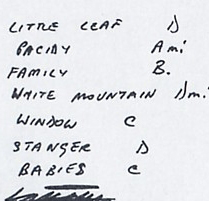
While the first two sets were rock sets, as it were, the band approached their calmer, more romantic songs. They started off with Little Leaf, an acoustic song penned by Phillips during the band's inactivity after the recordings for From Genesis To Revelation. The song was recorded by the band at Phillips' parents' home in summer 1969, but the recording is presumably lost. Anthony Phillips has since revealed that he remembers one of the lines of the chorus as particularly embarrassing ("bury my sorrow in fields of tomorrow"). In 1976 he recorded a solo guitar version of the song (released as Old Wives Tale on Archive Collection Volume II) and a reworked guitar duet version of the song in 1982 (released on Privat Parts & Pieces III – Antiques). It has also been rumoured that the first 50 seconds of Resignation, a song recorded on Janury 9, 1970 at the BBC for the Jackson Tape, are a part of Little Leaf.
Pacidy is a dreamy song in 6/8 and was mainly written by Mike Rutherford with some parts by Anthony Phillips before it was completed by the band. It was one of the four songs that were recorded as a demo on August 20, 1969, though the version fans know is from the BBC Night Ridesession recorded half a year later, on February 22, 1970.
Family is another Phillips / Rutherford song that was also recorded in the demo session in August 1969. It was recorded in a slightly changed version as Dusk on 1970's Trespass album.
Another track from From Genesis To Revelation found its place in this set. Window is the third song by Phillips and Rutherford in this set. It may be doubted that the brass and string arrangements from the album version were recreated live in this acoustic song.
White Mountain was the fourth track of the August 1969 demo, and it found its place in the live set, too. The basic idea for the song came from Anthony Phillips and Mike Rutherford. It was developed by the latter and Tony Banks. It appeared in Genesis set lists while Phillips was in the band, and it was recorded for Trespass. The last time it was played live was in 1976 during Phil Collins's debut tour as the singer.
Stranger was quite a new composition by Anthony Phillips. He wrote it in the summer of 1969. It was recorded (albeit with some flaws) on tape with Mike Rutherford. It was also recorded as a band version by Night Ride producer Alec Reid in 1969 and/or 1970, though those recordings seem to have been lost. Nicknamed "Strangler" because Phillips found it hard to hit the high notes in the middle the song did not survive for long in live sets. The only version of the song that has been released ever is from October 1990 when Phillips recorded a solo version of it as a bonus track for the re-release of his first Private Parts & Pieces album.
Babies was the last song of this set. Nothing is known about the song other than that it appears to have been played in C.
The fourth set (Encore?)
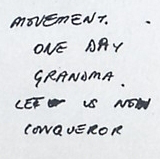
The fourth and last live set may possibly have been the encore block. It is unclear whether it began with The Movement or with There Was A Movement. The titles indicated different songs according to band statements. The unreleased song There Was A Movementwas recorded (at least once) as a demo on March 13, 1968. The Movement on the other side only developed during the summer of 1969. With its peak length of up to 40 minutes it is considered the band's first "mammoth track" that spawned many other songs such as Stagnation (released on Trespass in 1970), Moss (unreleased), The Light (performed live in 1970/71), Get 'Em Out By Friday (released on Foxtrot in 1972) and The Colony Of Slippermen(released on The Lamb Lies Down On Broadway in 1974). It is said to have been recorded at John Silver's parents's home.
One Day is another song from From Genesis To Revelation. This anthemic Banks/Gabriel composition was recorded as a demo in summer 1968 before it was recorded for the album in September 1968.
Nothing is known about the next song in the set, which is called Grandma. It appears to have been played live until spring 1970.
Anthony Phillips wrote the penultimate song of the set right after the sessions for From Genesis To Revelation when everybody went their ways. Let Us Now Make Love was frequently played live while Phillips was in the band. It was recorded for the BBC Night Ride sessions on February 22, 1970. In October 1990, Phillips recorded an instrumental version as the bonus track for the re-release of his Private Parts & Piece IV: Ivory Moon album.
The band finished their first concert with the strong Banks / Gabriel track The Conqueror from their debut album.
A number of other songs were shortlisted but did not make it into the first live set. Amongst those are cover versions of Crossroads (originally by Robert Johnson in 1937, better known in Cream's 1968 version) and Do I Still Figure In Your Life? (originally by The Honeybus in 1967, with a more popular version by Joe Cocker in 1969); both were played at later concerts. The shortlist also named In Hiding (from From Genesis To Revelation), Silver Song(Ant wrote the farewell song for John Silver in the summer of 1969; it was recorded in 1973 with Mike Rutherford and Phil Collins), Tony Banks' song The Shepherd(recorded for the BBC Night Ridesession on February 22, 1970 and played live, too) as well as the unknown songs Eastern Magic Boogie, Classic, Wandering, Epic and Think Again that may have ended up later in different songs.
All in all
The songs from From Genesis To Revelation were not discarded! Six song from the album and two additional songs from the sessions made it into the live set. All four tracks from their most recent demo were played. At least three of the songs that were played made it until the BBC Night Ride session in February 1970, and it is safe to assume that at least the proto-versions of all Trespass songs were part of the set. Variants of two or three songs ended up on Anthony Phillips's albums, while four to five tracks remain unidentified for us. Then there are four cover versions of songs the band liked at the time. It is easy to see that progressive elements such as the use of calm twelve-string guitars and harsher psychedelic rock moments were moving to the fore. This set list of 26 songs is unique, though, for it was not a regular gig – the band had to cover a full evening.
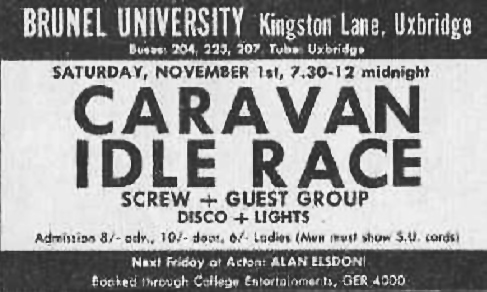
Their next (and first public) gig at Brunel University on November 1, 1969 was much shorter. Their support performance for Caravan and The Idle Race was riddled with slip-ups. According to the memories of various band members they played these songs. In The Wilderness, Masochistic Man, The Stumble[cover], Black Sheep[cover], Built Me A Mountain, In Limbo, Digby, Little Leaf, Babies, Key To Love [cover], Looking For Someone(Chobham Chords?), Twilight Alehouse [new!], Sitting On Top Of The World [cover], Pacidy. The band had taken the first steps!
Author: Steffen Gerlach
Photos: Brian Rootes, Brian Roberts
Setlists: unknown
English by Martin Klinkhardt

